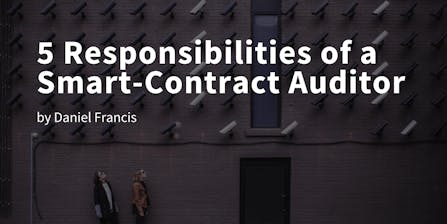
by Daniel Francis
5 Responsibilities of a Smart-Contract Auditor
Aug 24, 2022Table of contents
- Introduction
- Auditors Responsibility
- Summary
Introduction
Cryptocurrencies are known for having parabolic runs. The potential of excess gains can incentivize some investors to skip due diligence, resulting in the trend of "Apeing" into coins/tokens based on the fear of missing out (FOMO) on possible gains. Entire investment strategies rely on smart contracts working as they should, and when they can not, millions are at risk.
Smart contracts are immutable, and bugs cannot be easily patched, unlike regular programs. AuditOne.io is countering this by connecting projects with our skilled auditors to ensure a secure smart contract evaluation. Here are five responsibilities that smart-contract auditors must take on to make your project safe:
Auditors Responsibility
1. Understand Documentation
The development team provides the auditors with the documentation. The auditor goes over the documentation to know the intended behavior of smart contracts, ensuring secure integration of third-party libraries. Understanding what the smart contract does helps focus testing strategy as the auditor can test for what a contract should be able to do and identify unpredictable actions.
2. Automated and Manual Code Analysis
Automated code analysis tools such as CoinRisk can detect bugs that humans might overlook. The goal of using tools is to uncover common pitfalls smart contract developers make. Auditors are familiar with several typical security flaws. The SWC Registry defines and categorizes security concerns in smart contract systems and architecture. For any such vulnerabilities found, the auditor can determine whether they are false positives or, if any, can impact security.
Testing Tools
- Mythril - Security analysis tool for Ethereum virtual machine (EVM) bytecode.
- Mythx — Automatically examines Ethereum and other EVM-based blockchain smart contracts for security flaws.
- Oyente — Symbolically executes smart contracts; it can detect unchecked external calls, reentrancy, block info dependency, and transaction state dependency.
- Slither — Static analysis framework with detectors for many common Solidity issues.
- Securify — Detects various security issues such as input validation, reentrance, etc.
- Manticore — A symbolic execution tool for analysis of smart contracts and binaries.
- Solgraph — Visualize Solidity control flow for smart contract security analysis.
- Sūrya — A set of utilities for exploring Solidity contracts like visual outputs and information about the contracts' structure.
- Piet - A tool helping to grasp solidity smart contract architectures.
The manual code review inspects every line of the code, ensuring that every detail in the smart contract specifications is satisfied and no other threats are detected. If not, the auditor will communicate recommendations to the dev team to fix before issuing the final report.
3. Gas Optimization and Compliance
Networks charge gas fees to cover transactions. Auditors ensure that smart contract activities waste as little gas as possible to reduce operational costs. Contracts are inspected to determine whether it adheres to current smart contract development best practices. The smart contract may inadvertently violate government or industry rules. Auditors look for regulatory requirements and provide recommendations if required.
4. Live Testnet
A comprehensive smart contract test suite is executed on a local test network. The auditors examine whether the smart contract can perform as intended and what happens when unexpected inputs are made.
5. Report
Once the auditing process is completed, a detailed report is drafted. Vulnerabilities previously reported to the dev team should be fixed. If not, it will be highlighted in the report. The report's purpose is to provide reasonable assurance over the system's completeness and accuracy of data.
Summary
A smart contract auditor must be allowed to examine a contract thoroughly. The dev team could ultimately not agree with the auditor's recommendation. Any recommendations made are not an indictment of the performance of the dev team.
Alternatively, using an open-source smart contract could be beneficial. Most likely, it is battle-tested by other projects and might not require auditing. AuditOne.io is here to help any project through this process.

